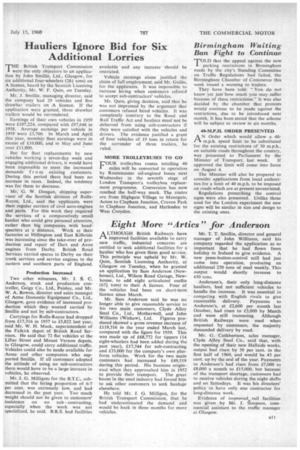Eight More "Arti cs" for Anderson
Page 45

If you've noticed an error in this article please click here to report it so we can fix it.
LTHOUGH British Railways have
k improved facilities available to carry new traffic, industrial concerns are entitled to seek additional facilities for a haulier who has given them good service. This principle was upheld by Mr. W. Quin, Scottish Licensing Authority, at Glasgow on Tuesday, when he granted an application by Sam Anderson (Newhouse), Ltd., Wilson Road Garage, Newhouse, to add eight articulated outfits (671 tons) to their A licence. Four Of the vehicles had been on short-term licence since March. Mr. Sam Anderson said he was no longer able to give reasonable service to his two main customers, Clyde Alloy Steel Co., Ltd., Motherwell, and John Williams (Wishaw), Ltd. Figures produced showed a gross revenue increase of £119,516 in the year ended March last, compared with the figure for 1959. This was made up of £68,772 for tippers (14 eight-wheelers had been added during the past year), £17,744 for sub-contracting and £33,000 for the company's own platform vehicles. Work for the two main customers had increased by £49,519 during this period. His business originated when they approached him in 1952 to provide their transport. The great boom 'in the steel industry had forced him to ask other customers to seek haulage elsewhere. He told Mr. J. G. Milligan, for the British Transport Commission, that he had underestimated the demand and would be back in three months for more vehicles. Mr. T. T. Smillie, director and general manager of John Williams, said his company regarded the application as so important that he had flown from holiday in Ireland to give evidence. A new press-button-control mill had just come into operation, producing an additional 250 tons of steel weekly. This output would shortly increase to 450 tons.
Anderson's, their only long-distance hauliers, had not sufficient vehicles to handle the increase. It was essential in competing with English rivals to give reasonable delivery. Payments to Anderson's, at £2,600 per month last October, had risen to £3,000 by March and were still increasing. Although British Railways were used when requested by customers, the majority demanded delivery by road. Mr. G. Cuthbertson, sales manager, Clyde Alloy Steel Co., said that, with the opening of their new Hallside works, output had risen by 30 per cent. in the first half of 1960, and would be 45 per cent. up by the end of the year. Payments to Anderson's had risen from £7,000 to £8,000 a month to £15,000, but because of the transport shortage, customers had to receive vehicles during the night shifts and on Saturdays. It was his directors' policy to have only one contractor for long-distance work. Evidence of improved rail facilities was given by Mr. J. gimpson, commercial assistant to the traffic manager at Glasgow.




















































































































